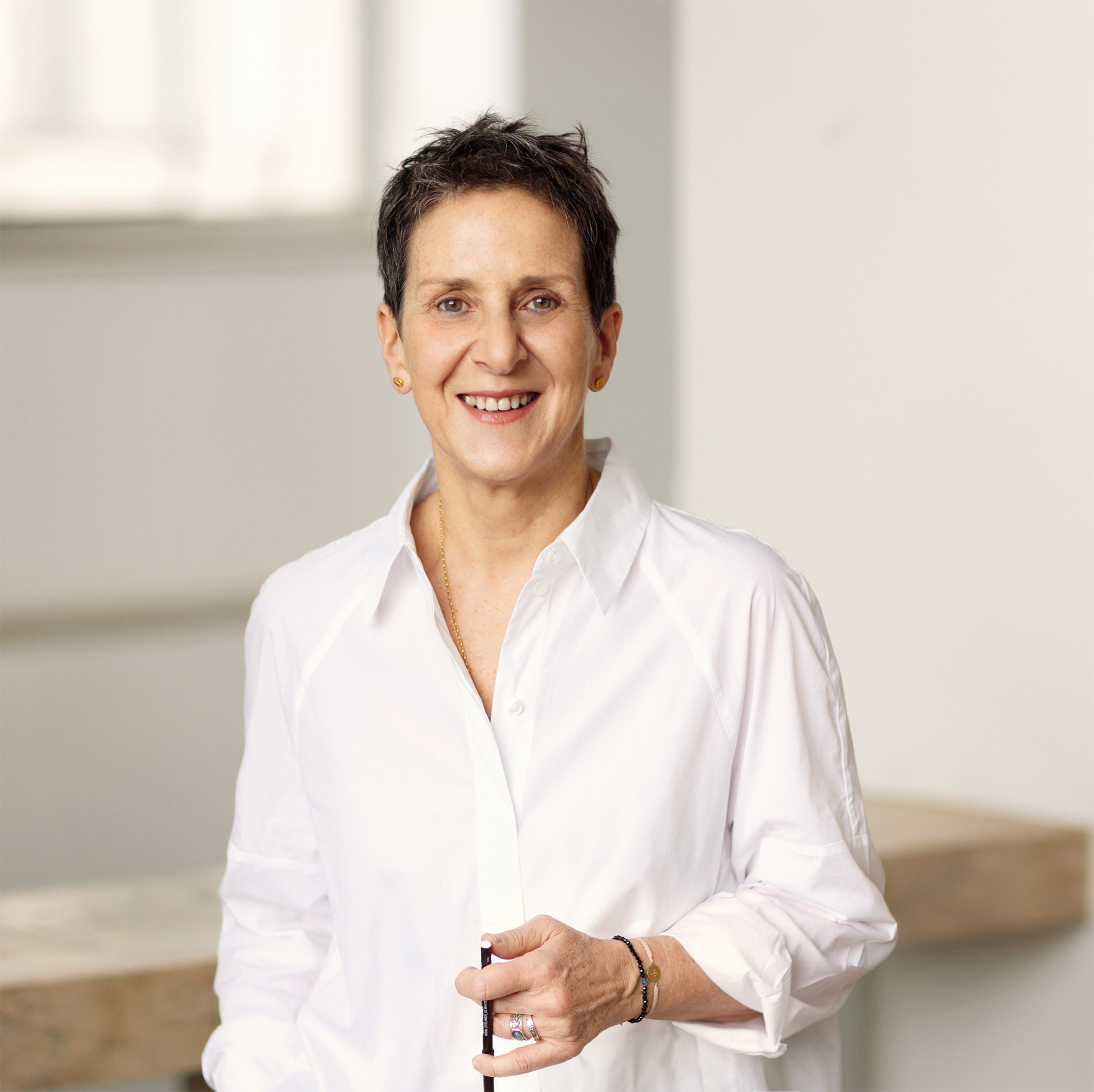

Konstantia Gourzi
*31 March 1962
Works by Konstantia Gourzi
Biography
Konstantia Gourzi, 2023 Opus Klassik award-winner, is one of the most important female composers of our time. For more than 30 years, the composer, conductor and university professor has enriched contemporary music in a unique way with her world-exploring sound cosmos and authentic language. She sees composing and conducting as two parts of one whole - an inseparable relationship that is mutually beneficial.
In Konstantia Gourzi's music, one experiences an inner glow and a great dramatic power that does not shout, but comes from silence and centering. Her poignant music, which invites reflection, often creates a great effect with just a few instruments. In many of her works, she creates a touching juxtaposition of complexity and simplicity that gets right under your skin.
Konstantia Gourzi's compositional work includes works for orchestra, chamber ensemble and solo pieces as well as works for music theater and film music. She therefore opens up unique, authentic sound journeys for the listener - an exploration of worlds of perception through music. Gourzi repeatedly engages with social challenges and timeless natural themes: she feels an inner urge to transform these themes through the unique energy of music.
Konstantia Gourzi studied piano, composition and conducting in her home city of Athens and at the Berlin University of the Arts (now UdK). She was influenced by composers such as Péter Eötvös, Sofia Gubaidulina, Hans Werner Henze, Aribert Reimann, Iannis Xenakis, Isang Yun and György Kurtág, with whom she worked closely from 1991 to 1996, as well as by conductors such as Sylvia Caduff, Michael Gielen, Carlos Kleiber, Giuseppe Sinopoli, Günter Wand, and Claudio Abbado whom she assisted with the Berlin Philharmonic Orchestra in 1995.
Since 1991, Konstantia Gourzi has founded and directed various ensembles, including the ensemble attacca berlin, the ensemble echo, the ensemble oktopus and the network and ensemble opus21musikplus. From 1999 to 2007, she was ensemble director of New Music at the Hanns Eisler Academy of Music in Berlin, and since 2002 she has held a professorship in the same position at the Academy of Music and Theater in Munich.
In recent years, Konstantia Gourzi's commissions have included the ARD Music Competition, the Bamberg Symphony Orchestra, the BBC, the Bavarian State Opera, the Venice Biennale, the Grafenegg and Kreisau Festivals, the Lucerne Festival, the Molyvos International Music Festival, the Berlin State Opera and the Tonkünstler Orchestra. She composes for soloists such as Simon Höfele, Anastasia Kobekina, Francois Leleux, Nils Mönkemeyer, Julian Prégardien and William Youn; as well as for ensembles such as Corund, the Feininger Trio, the Meitar Ensemble, the Minguet Quartet and Munich Opera Horns.
Konstantia Gourzi’s music has been recorded on labels including ECM, GENUIN, NEOS and Sony Classical. Several albums have been nominated for the International Classical Music Awards and the German Record Critics' Award. She released six recordings of new music in 2023, and two further albums will follow in May 2024.
The pressing desire to create, through the fusion of different musical traditions, connection and respectful coexistence between people from different cultural backgrounds, also constantly inspires Konstantia Gourzi to develop new performance concepts. She regularly collaborates with musicians from other regions of the world as well as with visual artists and dancers and brings new music to unusual performance venues. She is also passionately committed to promoting young talent.
As a conductor, in recent years she has been focusing on developing special projects. As "Composer and Conductor in Residence", for example, she curated and conducted innovative formats for the Eigenzeit Festival with the Duisburg Philharmonic Orchestra in 2023 and led the transcultural "Call for Compositions".
In addition to performances of her music worldwide, several new works by Konstantia Gourzi will be premiered in the 2024 season, including with recorder player Dorothee Oberlinger, pianist Cathy Krier, trombonist Mikael Rudolfsson and the Cuarteto Quiroga. She was invited by the Mecklenburg-Vorpommern Festival to compose a new work for the opening concert with the NDR Elbphilharmonie Orchestra. As part of a second program there, she will also conclude her three-part "Connections" cycle as conductor and composer to mark the 35th anniversary of the fall of the Berlin Wall. She is curating a special program for the Bach Choir Salzburg for June 2024, which she will also compose and conduct a musical triptych on the theme of "Goddesses of Fate".
Dr. Susanna Schulz, November 2023
About the music
My music is influenced by my Greek roots, history and what I have learned and am learning during my studies and life. I try to create a mixture of sounds involving melodies, rhythm and timbre in each piece. My wish is to build the music dramaturgically in such a way that you can feel it emotionally, but at the same time it also gives you the space to perceive yourself within it. The question of identity in music and the understanding of the world remains very exciting and challenging.
The inspiration can be a musician or the ensemble asking me to write a piece for them; it can be nature, or a social or political issue. There is usually an urge to describe something with music and often also to transform a situation. Music allows me to "speak" about a theme, about a problem or about beauty on another non-verbal level and trust it.
Being conscious of tradition and carry it forward into today considering the contemporary themes and social tensions is one of the goals for myself as a composer and as a conductor.
